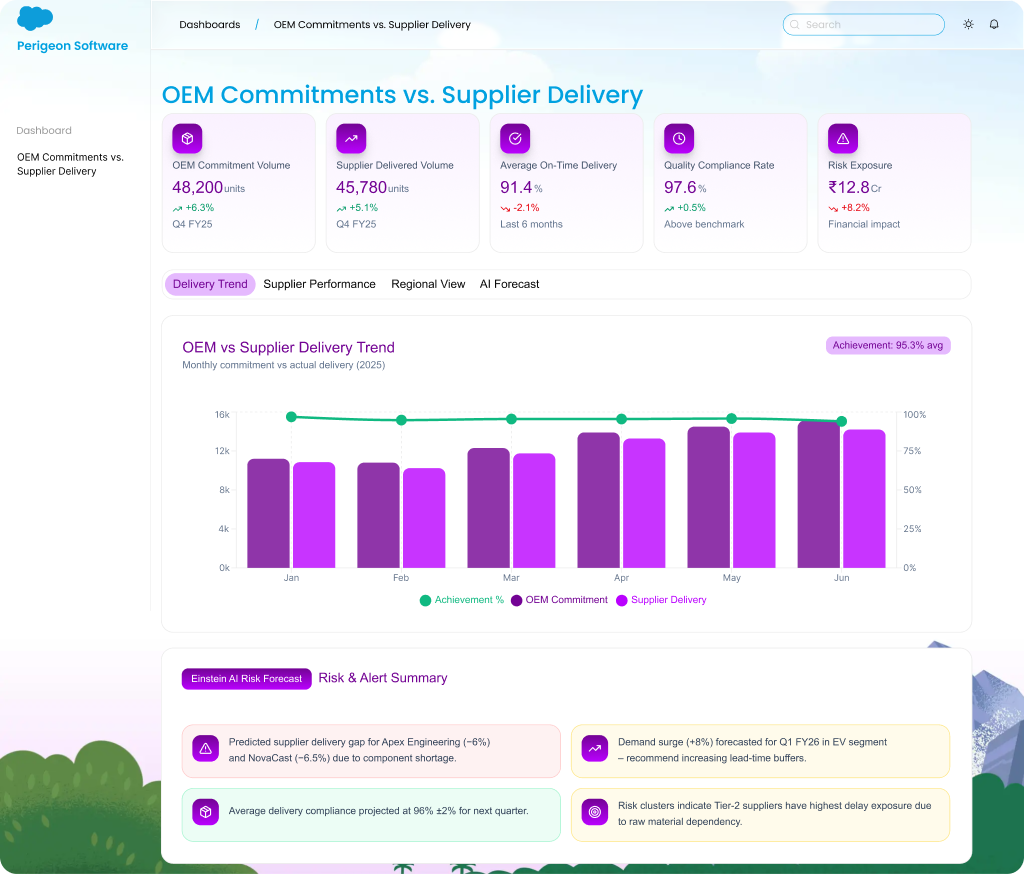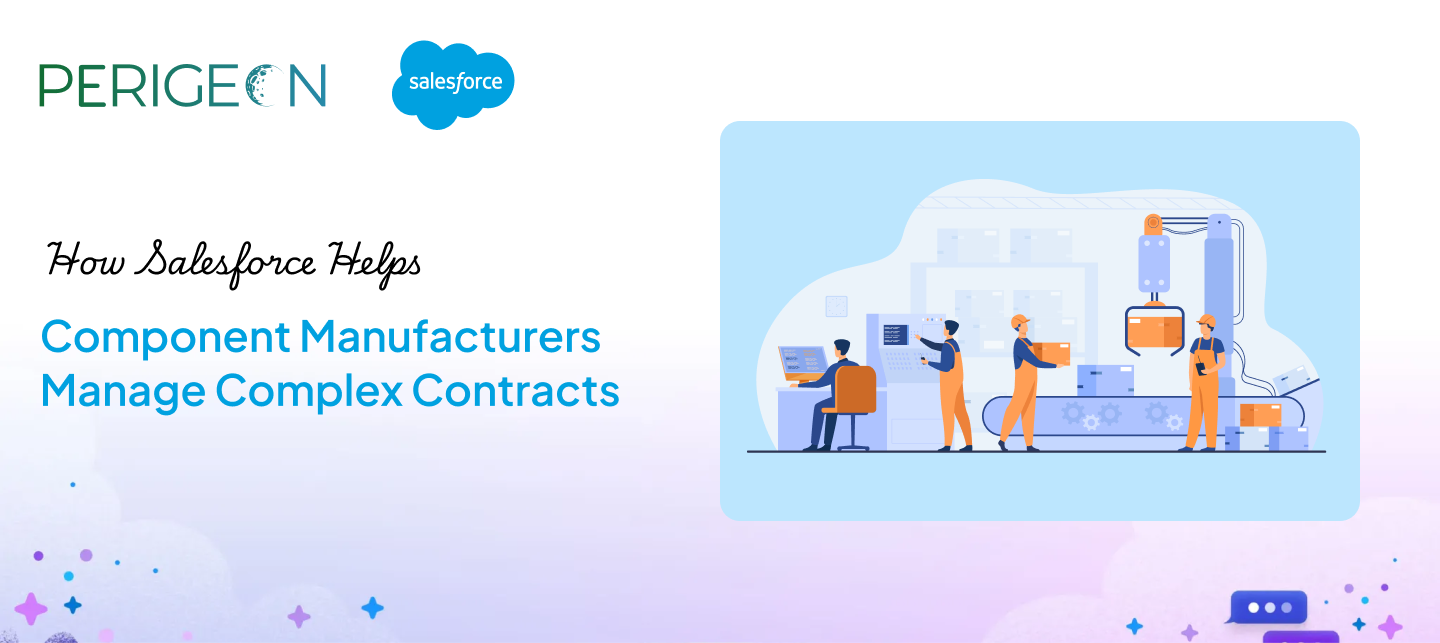Table of content
Introduction
The Complexity of Contracts in Auto Components Manufacturing
Key Challenges in Managing Complex Contracts
How Salesforce Manufacturing Cloud Simplifies Contract Management
Case Study: Streamlining Contract Management for a Tier-1 Supplier
The Future of Contract Management in Component Manufacturing
Conclusion
Introduction
In the auto components industry, contracts are the lifeblood of business relationships. From Tier-1 suppliers delivering engines and batteries to Tier-3 suppliers providing fasteners and plastics, every manufacturer operates under complex, long-term agreements with OEMs and distributors.
Yet, these contracts are rarely straightforward. They include:
- Volume-based commitments with penalties for non-fulfillment.
- Multi-tier rebate structures tied to sales performance.
- Global compliance clauses, varying by region.
Managing these contracts manually, or through disconnected systems, exposes manufacturers to risks such as penalties, disputes, and revenue leakage.
Salesforce Manufacturing Cloud provides a centralized, AI-driven platform for contract visibility, compliance tracking, and performance management, empowering component manufacturers to reduce risk and build stronger OEM relationships.
![]()
The Complexity of Contracts in Auto Components Manufacturing
Contracts in this sector are often:
- Multi-Year → Spanning 3–7 years, covering thousands of units annually.
- Multi-Tier → Involving OEMs, Tier-1, Tier-2, and Tier-3 suppliers.
- Conditional → Subject to rebates, penalties, or incentive triggers.
- Dynamic → Updated frequently to reflect EV adoption, new regulations, or product recalls.
? Without digital tools, contract management becomes error-prone, opaque, and costly.
Key Challenges in Managing Complex Contracts
1. Multi-Tier OEM & Supplier Agreements
- Contracts often cascade across OEMs, Tier-1s, and downstream suppliers.
- Lack of centralized visibility creates confusion and misalignment.
2. Volume-Based Rebates & Penalty Clauses
- Contracts include tiered rebates tied to production volumes or sales milestones.
- Penalty clauses apply if delivery or quality benchmarks aren’t met.
- Manual tracking leads to >s and lost trust.
3. Lack of Contract Transparency
- Dealers and OEMs rarely have real-time visibility into contract performance.
- This causes disputes, as parties interpret terms differently.
4. Manual Tracking & Compliance Risks
- Spreadsheets dominate tracking of rebates and penalties.
- Missed deadlines or errors lead to compliance breaches and fines.
5. Global Legal & Regulatory Variability
- Contracts span multiple jurisdictions (U.S., EU, Asia).
- Each region has unique legal frameworks for warranty, emissions, and safety compliance.

How Salesforce Manufacturing Cloud Simplifies Contract Management
Salesforce Manufacturing Cloud delivers a unified, transparent, and intelligent approach to contract management for component manufacturers.
1. Centralized Sales Agreements Repository
- Digitizes contracts and stores them in a single platform.
- Provides a 360° view of contract terms, commitments, and obligations.
- Accessible to both internal teams and external partners (as permissions allow).
? Example: A Tier-1 supplier can see its 3-year contract with an OEM, along with all milestones and performance metrics, in one dashboard.
2. Automated Rebate & Penalty Tracking
- Configures complex tiered rebate structures directly in Salesforce.
- Tracks rebate eligibility and penalties automatically, reducing disputes.
- Dealers and OEMs can view real-time status, eliminating reconciliation delays.
? Statistic: Gartner estimates that manual rebate tracking causes 3–5% revenue leakage annually in manufacturing.
3. Real-Time Performance Monitoring
- Dashboards track:
- OEM commitments vs. actual deliveries
- Contractual milestones (e.g., EV component volumes)
- Rebate and penalty progress
- Ensures no contractual obligations are missed.

4. Dealer, OEM & Supplier Collaboration via Portals
- Salesforce Experience Cloud enables shared contract portals.
- Dealers, OEMs, and suppliers access up-to-date contract performance.
- Builds trust and transparency across the ecosystem.
5. Integration with ERP & Legal Systems
- Connects with ERP platforms (SAP, Oracle) for financial reconciliation.
- Integrates with legal contract management tools for compliance audits.
- Provides a closed-loop system between sales, operations, and legal.
6. AI-Powered Contract Analytics
- Einstein AI analyzes contract terms to:
- Flag at-risk commitments.
- Highlight opportunities for renegotiation.
- Identify patterns of disputes or penalties.
- Provides predictive insights into contract performance outcomes.
? Example: AI predicts that a supplier may miss a delivery milestone due to raw material shortages, prompting proactive OEM communication.
Case Study: Streamlining Contract Management for a Tier-1 Supplier
A European Tier-1 supplier managing 15+ OEM contracts faced:
-
- 30% of contracts requiring manual dispute resolution.
- Frequent penalties due to missed volume thresholds.
After implementing Salesforce Manufacturing Cloud:
- 90% of rebate calculations were automated.
- Penalty disputes reduced by 65% in the first year.
- OEM trust improved significantly, leading to a new 5-year strategic partnership.
The Future of Contract Management in Component Manufacturing
The next generation of contract management will be powered by:
- Smart Contracts (Blockchain): Automated execution of rebates and penalties.
- AI Contract Negotiation Assistants: Recommending optimal terms based on market trends.
- Sustainability Clauses: Embedding ESG metrics into contracts.
- Global Digital Standards: Harmonizing compliance across regions.
According to Accenture, automated contract lifecycle management could reduce operational costs by 30% in manufacturing by 2030.
Conclusion
Complex contracts are inevitable in the auto components industry, but manual management doesn’t have to be. Salesforce Manufacturing Cloud empowers suppliers to:
- Centralize and digitize contracts for full visibility.
- Automate rebate and penalty tracking to reduce disputes.
- Monitor performance in real time to avoid compliance risks.
- Enable transparency across OEMs, dealers, and suppliers.
- Leverage AI analytics for predictive contract performance.
For component manufacturers under OEM pressure to deliver more with less, Salesforce provides the foundation for contractual trust and efficiency.
? Ready to simplify your complex contracts?
? [Book a Manufacturing Cloud Strategy Session with Perigeon]




